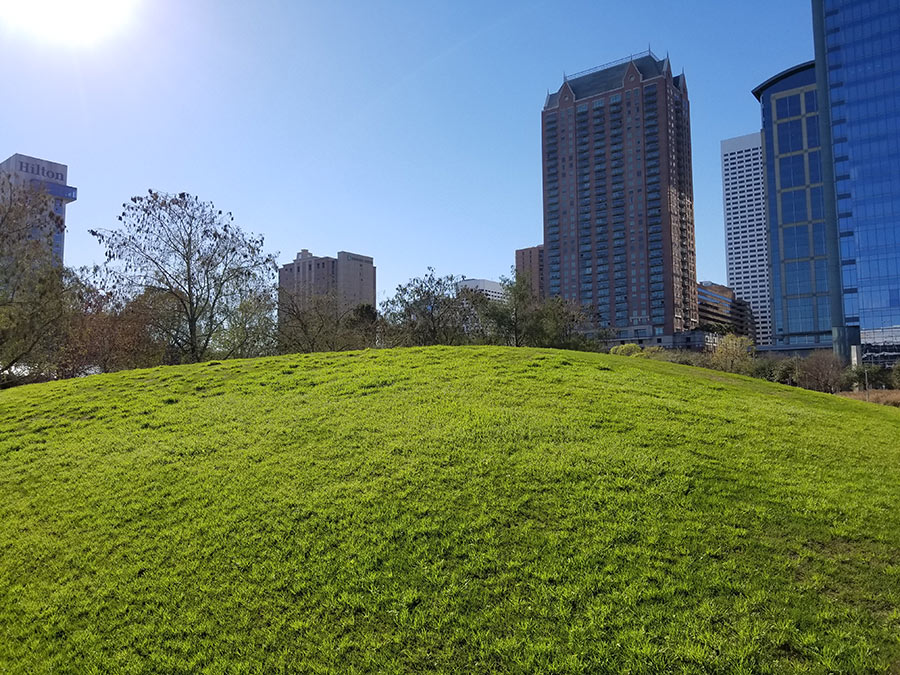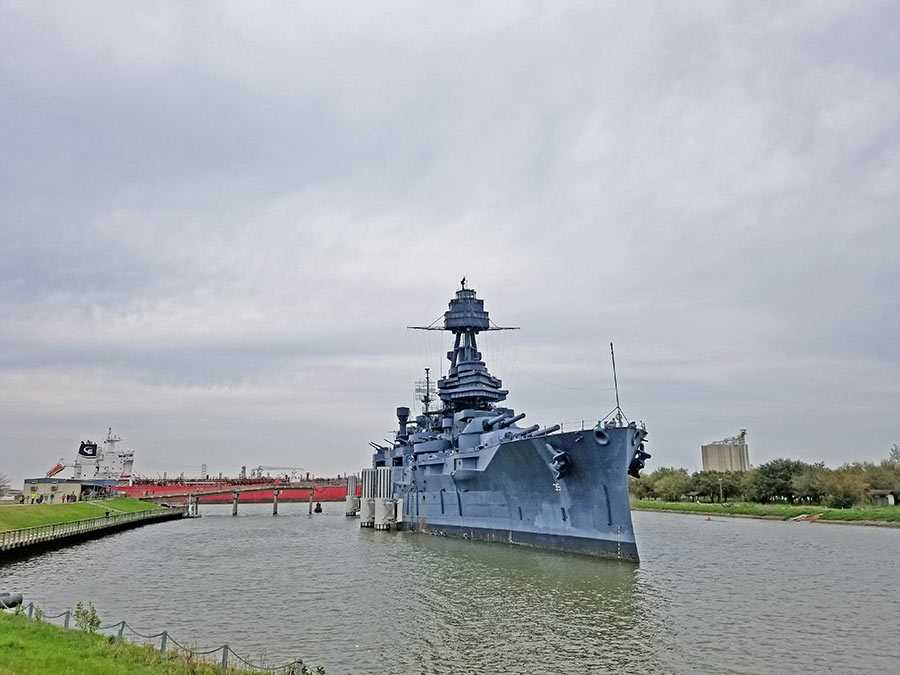
- Camp Strake Property at I-45 North, Loop 336 To Feature Mix of Residential, Office, Retail, Hotel and Conference Center Space [Houston Business Journal; previously on Swamplot]
- Builders Open Model Patio Homes in Imperial Sugar Land [Prime Property]
- Houston May Move to a ‘Baltimore Model’ and Hand Operations of Its Municipal Golf Courses to a Nonprofit [Houston Politics; previously on Swamplot]
- Texas Will Spend $15.3 Million To Bring SpaceX Spaceport to Waterfront Site Near Brownsville [SciGuy]
- Tired of Feud, Legislators Tell Backers of Very Different ‘Ike Dike,’ Centennial Gate Proposals To Create Compromise Plan [Houston Chronicle; previously on Swamplot]
- Three Arrested in Botched, Mannequin-Shooting Robbery of Adult Novelty Store at 9820 North Fwy. [Houston Chronicle]
- The Richmond Restaurant with the Same Sign as Closed Montrose Institution Felix Mexican Restaurant [Houston Chronicle; previously on Swamplot]
- Getting To Know Houston Muralist Anat Ronen [Houstonia]
Photo of Outlaw Dave’s Worldwide Headquarters at 6502 Washington Ave.: Russell Hancock via Swamplot Flickr Pool
Headlines





The patio homes in the Sugar Land development appear to be detached; what does “patio” mean in this case?
As a general rule, Patio Home means tiny yard and 1 to 2 stories and no shared wall. A Townhome may have no yard at all or a small yard but is generally 3 stories plus and may have a shared wall. Now, don’t ask me what the difference is between those and a Garden Home, or City Home, or Urban Home.
Detached single family homes can be a patio home. Typically there is little to no yard with only a small patio in the back or side.
Lot of the inner loop town homes can be classified as a patio home because they don’t have common walls.
Generally patio home means fully detached (no shared wall dividing interior spaces between homes), but with at least one wall on the lot line.
Please put the Ike Dike pipe dream waste of public $$ to sleep. Forever.
Why should “everyone else” have any interest in spending billions to keep Galveston dry? The place is built on a barrier island, for God sake. If Galvestonians want to pay for it, fine, but leave the rest of us out of it. You can’t beat Mother Nature – delay her, perhaps, but in the end, no matter how much you spend, she will get her way.
The Ike dike IS everyone US citizen’s problem. If we get hit by a direct storm and it takes out the ship channel, not only will the country be economically devastated; but the environmental damage could be catastrophic. It would be the Galveston hurricane equivalent for Houston. The most concentrated area of petrochemical facilities IN THE WORLD would no longer function. Say goodbye to your property values. Say goodbye to your job.
Sorry folks, we’re all in this one together. Your Tea Party logic fails when real world problems are applied.
‘every’ not ‘everyone’
Tell that to the warmist crowd.
Nope, not Tea Party logic from me. All the industry on the Ship Channel seems to be of the “for profit” variety. No doubt each (well, maybe not each, but certainly the larger, responsible operators) have evaluated its risk, and decided what it must do to protect its investment and profit stream. We can all hope that what they have decided is not to “wait for government action”, but we certainly encourage that approach with what can only be characterized as a “bail out scenario” if we continue such earnest discussion of these crazy plans relying on public funds. And no matter how IMPORTANT TO THE WORLD Ship Channel industry is, all human effort to “shut out” acts of nature will ultimately prove fruitless.
DNAguy: that was a cheap “tea party” shot. I consider myself a tea party person insomuch as I want a small government and want to be generally left alone. I think personal freedom and a free market can solve most issues. .
However, that doesn’t mean I (or most “tea part types” in general) see no use for government to supply infrastructure for the common good. That would include projects that would otherwise stop a major disaster (economic or otherwise) from happening.
.
I haven’t looked into this specifically but if there is strong consensence that building this would very likely save more in damages than it would cost than I’d be all for it. I’d assume those against it haven’t been convinced of its value rather than being what you’re calling “tea party types” in a derogatory way.
The case for there being a public interest in protecting the refineries and the navigability of the Houston Ship Channel (as well as the Port of Texas City and the Port of Galveston) is a strong one. Most of the plants have sited their buildings and equipment on high ground or built their own private levees, but they tend to only invest enough money such that they are themselves protected; and even then, only up to a point. The economics of risk mitigation are typically such that the protection is not and should not be absolute. Absolute protection is very expensive and the worst case scenario is very improbable. However, if the costs were shared among all plant operators or more broadly by all of the economic constituents of the port, then it is very easy to construct a scenario where everybody should say yes — to the Ike Dike concept.
The ‘Centennial Gate’ does not protect the ship channel itself, which already suffers from sedimentation and is never as deep as its authorized depth. When a major storm comes through, the turbidity of the water shifts the sediment around and poses hazards to navigation. This is everybody’s problem and that it is unprotected is a market failure. This is also a challenge with the various other channels through the Galveston Bay complex.
The ‘Centennial Gate’ proposal also does not protect communities along Galveston Bay which, by and large, if they are west of SH 146 and not right up against Clear Lake itself or along Dickinson Bayou, are high and dry. Although new housing is mostly built above the base flood elevation, existing housing stock there is subject to some extremely high flood insurance premiums. The ‘Ike Dike’ would protect them and save money for homeowners that would otherwise have gone to insurance companies and out of the region.
When a storm does hit the Houston area, there is a tremendous amount of damage done throughout the region, but especially in the coastal communities. To cope with this, a swarm of contractors and claims adjusters swoops down upon the area all at once; but there is never enough supply in that moment of time to keep pace with demand. The price of contractor services spikes. Anything that we can do to minimize the amount of damage within our region from a windstorm will help to mitigate the spike in prices that comes during its aftermath. And yes by the way, insurance companies do build this into your windstorm and flood premiums, no matter where you live in the Houston area.
Then there’s recreation. Galveston Bay already comprises one of the largest marina complexes in the United States. However, significant amounts of marina capacity and of private vessels are destroyed by each major hurricane. They’ve built back much stronger this last time, but it comes at a high price to the marinas and to their customers. And their customers, of course, also pay for insurance on their boats. It isn’t cheap. If we protect and facilitate the development of marinas and yachting and other related water sports and tourism, that will benefit the region both economically and as an enhancement to the quality of life.
Recreation goes hand in hand with the environmental argument for the Ike Dike. Hurricanes do a tremendous amount of damage to marshes and oyster beds. The marshes and oyster beds play an important part in filtering the water of pollutants, and the estuary system as a whole is important for the production of seafood.
Wow, the Strake property is going to be more of the same that you can already find at The Woodlands, and under construction in front of the Exxon campus – – I can’t wait….
TheNiche- Wow, that’s a lot of excuses to waste billions (billions with a b) on a pipe dream. We’ll see how how supportive the local coastal communities really are when it comes to check writing time.
I’m tired of all this socializing of costs to industry, while industry enjoys some pretty fat and private profits.